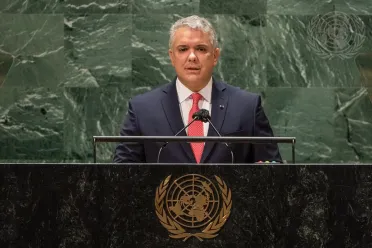Statement
Statement summary
IVÁN DUQUE MÁRQUEZ, President of Colombia, observed that the pandemic has exposed and deepened divides between nations, particularly in terms of vaccination policies, with some States ordering more than enough doses for their populations — including plans for third booster shots — while other countries have yet to receive one dose. Colombia confronted the pandemic on three fronts: health, caring for vulnerable citizens and reopening the economy. It aims to provide vaccines to cover 70 per cent of Colombian citizens and is part of the COVAX alliance. Calling on the international community to make progress on global public health, he warned that if delays in the fair distribution of vaccines continue, virus variants will flourish. “Global herd immunity requires solidarity.”
To support its most vulnerable citizens, Colombia implemented the most ambitious social agenda in its history, he said. It will continue to provide an emergency allowance income to eligible citizens until December 2022 and has supplied direct financial support to 25 per cent of its population. In addition, the Government established an employment subsidy that protects workers. Such achievements are part of an effort at fiscal responsibility which will allow Colombia to service its debt, reduce the deficit and stabilize public financing. As for private, public and private-public investment, the country has seen its best growth quarter in a century and is on track to 7 per cent growth in 2021. Such economic recovery is the best way to address the pandemic crisis and get back on track to achieve the Sustainable Development Goals, he said.
Turning to the international debt crisis, he urged the international community to achieve a global consensus, led by the International Monetary Fund (IMF), to set new criteria in the post-COVID recovery period for developing countries. If such measures are not taken, the crisis will further increase setbacks and global recession effects. As for the global climate crisis, he pointed out that Colombia only represents 0.6 per cent of global emissions but is among the most affected by climate change. In that context, his country is going to the Glasgow Climate Change Conference with a commitment to reduce emissions by 50 per cent by 2030 and to achieve carbon neutrality by 2050. Colombia places special importance on generating renewable energy to increase capacity and ensure zero deforestation by 2030, he said. To support those efforts, he suggested establishing a rule that allows expenses used towards addressing structural climate change be matched against debt structures. The Latin American and the Caribbean region needs an increase in green funding, he emphasized.
The crisis in Venezuela represents the worst migration crisis in the world right now, he went on, reporting that Colombia is working to provide temporary protection status to Venezuelan migrants, an effort that requires disbursements from the international community, as agreed on during the donor conferences. Moreover, a solution to the conflict in Venezuela will only be found through immediate presidential elections, he stressed, cautioning that any outcome that perpetuates the dictatorship will exacerbate the disaster there.
For its part, Colombia is working on peacebuilding within the law, he said, citing the Government’s agreement with FARC [the People’s Alternative Revolutionary Force] that continues to progress and allows for reintegration of former combatants. Today, Colombia enjoys the lowest rates of homicides and kidnapping in decades. Young people, having been hit hard by the pandemic, lead the great debates on climate action, he said. As such, Colombia signed a youth pact that will create genuine policy change that will directly benefit them. The newly established Municipal Youth Councils will validate the views of young citizens, he said. In 2021, vaccination in Colombia is moving forward and the economy is reopening. Colombia is committed to “reparation and not repetition”.
Full statement
Read the full statement, in PDF format.
Photo

Previous sessions
Access the statements from previous sessions.
